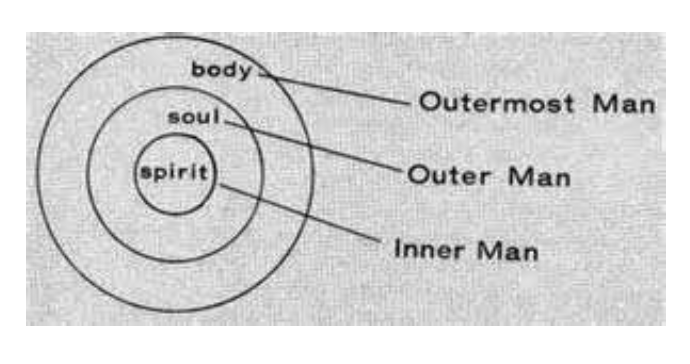Release of the Spiritনমুনা

"Release of The Spirit" by Bryan Craig

DAY ONE
“May God Himself, the God of peace, sanctify you through and through. May your whole spirit, soul and body be kept blameless at the coming of our Lord Jesus Christ.” 1 Thessalonians 5:23 NIV
Not to be morbid, but have you ever attended an open-casket funeral and seen a dead body lying there? If you have, you quickly realized that something was missing. Morticians try to put make-up on a corpse to make it resemble the real person, and you recognize the person you knew, but it’s not them. We see their body, but we don’t see them. It’s clear that something has departed the body. I’ve always thought that whatever it was that departed was the part that goes to Heaven or wherever it is destined.
I’ve always had some confusion about that inner part of man, described as the “soul” or the “spirit”. I was recently given a book, which was collected from teaching by a Chinese Christian brother, Watchman Nee, back in 1948. It is entitled, “The Release of the Spirit,” and it has so captivated me that I wanted to share some of its thoughts with you for your own edification and contemplation.
In the verse above, Paul mentions 3 distinctive parts of a man… his spirit, his soul, and his body. Brother Nee explains that the body and the soul are “Outer Man”, which is the part which others see in us. The body is obvious. It is our physical body, with our appearance, as well as our senses like sight, sound, smell, taste, and touch. The soul is described by Nee as our thoughts, emotions, will. This would encompass our personality. He says this is part of Outer Man, but it is a deeper layer of a man within his body. It also should be noted that the soul is eternal. Scripture addresses the “soul” often.
A few examples:
“Love the Lord your God with all your heart and with all your soul and with all your strength.” Deuteronomy 6:5 NIV
“He restores my soul.” Psalm 23:3a NIV
“Do not be afraid of those who kill the body but cannot kill the soul. Rather, be afraid of the One Who can destroy both soul and body in hell.” Matthew 10:28 NIV
Lastly, there is the “Inner Man” which is called a man’s spirit. Nee teaches, “When God comes to indwell us by His Spirit with His life and power, He comes into our spirit at the time we were born again. (John 3:6) This regenerated spirit located at the center of man’s being is what we call the inward man.”
Another helpful verse in understanding the spirit of man:
“For who among men knows the thoughts of a man except the man’s spirit within him? In the same way no one knows the thoughts of God except the Spirit of God. We have not received the spirit of the world but the Spirit Who is from God, that we may understand what God has freely given us.” 1 Corinthians 2:11-12 NIV
So, why is any of this significant? The Holy Spirit unites Himself with the spirits of those who are born again, and from that moment, He is trying to infiltrate our Souls and our Bodies for His service. God wants His Spirit to be released through us. Nee says that like a grain of wheat, with its hard shell, that must fall to the ground and die so its shell can be cracked open, we, too, must have our hard outer shells cracked. (John 12:24) He likens it also to the woman who cracked open an alabaster jar of very expensive perfume, made of pure nard, and offered it as a sacrifice to Jesus (Mark 14:3). God has put this beauty inside of us, but we must be broken for it to spill out.
Let me encourage you that God is trying to do something very beautiful in you, his child if you will allow Him to crack open your outer self.
About this Plan

Have you ever thought about that inner part of man, described as the “soul” or the “spirit”? In “The Release of the Spirit,” Watchman Nee lends insight to the three distinctive parts of man. Over the next five days we will explore the scriptures and contemplate the relationship between the mortal and eternal parts of our being… our “Outermost Man,” “Outer Man” and “Inner Man”.
More









